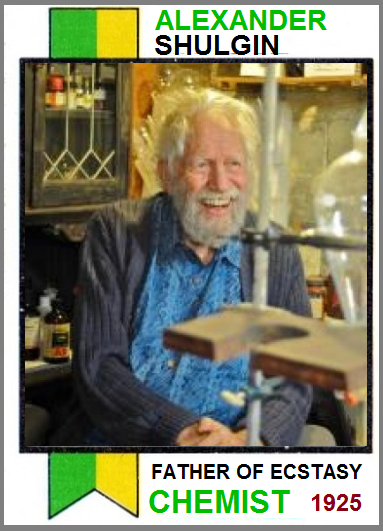
"Chemistry is
pornography in
disguise," Alexander Shulgin once said with a smile. "You just have
to know which functional group to look at." Though Shulgin delighted in
tweaking his moralist critics—for example, referring to his
chemical-structure
diagrams as "dirty pictures"—he was no Timothy Leary–style huckster
for better living through chemistry. He deserves to be remembered for
the full
scope of his contributions to pharmacological research, including the
creation
or synthesis of more than 200 compounds and investigations of numerous
others.
That many of his creations ended up on the DEA's controlled-substances
list,
closing off avenues to just the sort of pharmaceutical research that he
pioneered, says as much about America's misguided War on Drugs as it
does about
Shulgin and his works.
Shulgin began his
professional
career at Dow Chemical, where his discovery of the first biodegradable
pesticide made his employers enough money that they left him alone to
explore
his own interests. His early investigations of psychoactive compounds,
using
himself and his friends as test subjects, were extensively published in
research journals of the time, but as his creations began to make their
way out
of the lab and onto the street, Dow grew warier of his activities. The
company
finally cut ties with him in 1967, after high doses of a psychedelic
amphetamine, commonly known as STP, hit the black market and sent
hundreds in
San Francisco's Haight-Ashbury to emergency rooms. Undaunted, Shulgin
continued
his lab work as a free agent, consulting extensively with the DEA and
other
law-enforcement agencies as he explored new compounds and syntheses.
Shulgin's
relationship with the DEA
changed with the times: in the 1970s, the agency used his book Controlled
Substances as its standard reference and gave him a
Schedule 1 license to
work with otherwise-illegal substances, but in 1994, with the War on
Drugs at
full boil, his lab was raided and his license revoked; investigators
claimed
his books PIHKAL
("Pharmaceuticals I Have Known and
Loved") and TIHKAL
("Tryptamines I Have ...")
functioned as "illegal-drug cookbooks." By then many of the compounds
he'd created had been illegalized; MDMA, in particular, had gained
popularity
as a club drug; and the elderly scientist became an inadvertent
grandfather
figure for both club kids and libertarians, who appreciated his
keep-the-government-out-of-my-consciousness philosophy for different,
though
overlapping, reasons.
As the titles of his
books suggest,
Shulgin's relationship with his work was less ambivalent than that of,
say, LSD
discoverer Albert Hofmann (one of whose later books was titled LSD: My
Problem Child), but his advocacy did have limits: he
always maintained
that the substances he worked with should only be produced and used in
controlled circumstances, and he was a fierce critic of the profit
motives,
lack of quality control, and haphazard usage behaviors that the
illegal-drug
economy led to. It was a lifelong thorn in his side that the DEA
classified
MDMA as a Schedule 1 narcotic (no medical application and high
potential for
abuse), and only now are studies being done to examine its usefulness
in
treating PTSD and autism. Perhaps, one day, some of his other
creations can be reexamined as he examined them, for their potential
benefits as well as for their detriments.
Alexander Shulgin
died on June 2
after a long struggle with cancer. He was 89. Hulka, who enjoys
referring to
himself in the third person, gets ten points: five for the hit and five
for the
solo.
--Hulka